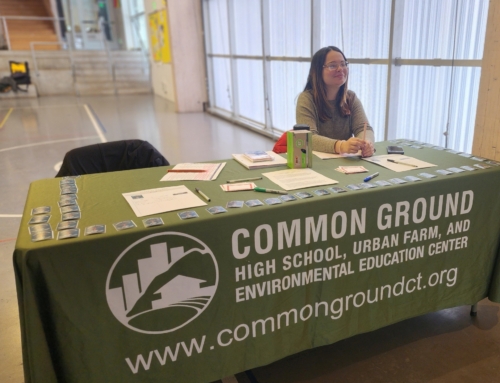Email newsletter readers: We sent out an incorrect link in our January 2014 email newsletter. If you are looking for Melissa’s reflection on the legacy of Javier Martinez, please click here.
This week, for the first time this winter, I looked out my window to see trees draped in a soft blanket of white snow. At home, this meant a beautiful start to the day. At school, the snow caused some headache and backache, along with an early dismissal at 11:25.
Despite the early dismissal on Tuesday, we served lunch to our students before sending them on their way. Having just come back from a symposium on hunger (“Rich State, Empty Plates” put on by End Hunger Connecticut!), I was especially appreciative that we could make this small contribution to the fight to end hunger. At Common Ground we are acutely aware that for some of our students the breakfast and lunch we serve are the most substantial and healthiest meals of their day. Without these meals — free to 100% of our students — there are certainly a significant number of Common Ground students who go through their day hungry.
Being hungry at school has clear consequences. Research has shown that being hungry has a negative effect on cognitive performance. Hungry kids are less able to concentrate, are less alert, are less able to comprehend and remember lessons than children who are fed breakfast and lunch. As a result, students who are hungry at school perform worse on their academic work , including standardized tests. Children who are not receiving proper nourishment are also more likely to become sick, miss school and fall behind in class. Given how many students would otherwise “skip” breakfast and lunch, whatever the underlying reasons, we make providing free meals to every student a top priority.
While there are many things that can cause our students to leave their house without eating breakfast or preparing a lunch, for some it is certainly because they live in food insecure households. Food Insecurity is defined by the USDA as “inconsistent access to adequate food caused by a lack of money and other resources at times during the year.” This means that food insecure households at times experience hunger or the threat of hunger. According to a study released in 2012, 14.54% of households in New Haven County are food insecure — the highest of any Connecticut region. That’s about 123,000 of our neighbors who do not have access to the food they need (http://feedingamerica.org/hunger-in-america/hunger-studies/map-the-meal-gap.aspx?utm_source=tbd&utm_medium=redirect&utm_campaign=mapthegap#).
At Common Ground we can easily justify our food budget (not a small expense!) based simply on the impact hunger has on academic performance. But we are also aware of the larger dynamics that contribute to food insecurity. Often the conversation about food insecurity focuses on government programs available to increase access to food for families in need. The three most important of these programs are SNAP (Supplemental Nutrition Assistance Program), WIC (supplemental food program for Women, Infants and Children), and the school lunch and breakfast programs. These programs are definitely part of the solution; 54% of food insecure households have incomes low enough to qualify for SNAP, WIC and free or reduced cost school lunches. The Economic Policy Institute provides data showing that these targeted programs keep 5.9 million people in the United States out of poverty. In Connecticut these three programs help feed well over half a million people. Nevertheless, and despite plenty of data demonstrating the devastating impact cuts to these programs will have on food insecure households, supplemental food programs are on the chopping block in Washington as Congress and the Senate debate not whether but how much they will be cut.
While supplemental food assistance programs are important safety nets, they do not actually address the root causes of food insecurity and hunger which, simply put, is primarily poverty. Therefore, if we are to really address food insecurity we need to address the underlying causes of poverty. In Connecticut more than 1 in 10 people live below the federal poverty level (372,000). Many of these people are working – 21.1% of working families in Connecticut are poor. The CT Citizen Action Group has estimated that the living wage for a single adult in Connecticut is $19.44 dollars an hour (or $40,000 per year), and for a family of four with one working adult it is $33.90 per hour ($70,000 per year). Connecticut’s minimum wage is set to increase to $8.70 per hour on January 1, 2014. This will raise the annual income of a full time minimum wage worker to $18,096, still well below the federal poverty threshold for a family of four ($22,891). Nevertheless, this raise will increase the buying power of 151,000 workers currently earning minimum wage in our state. 82% of these wage earners are over 20 years old, 21% are parents, and 74% work more than 20 hours per week.
Raising the minimum wage is not a silver bullet; it will not ameliorate all of the factors underlying poverty – but it is a start. And it does have a direct impact on students at Common Ground. Between 35 and 40 Common Ground students participate in our Green Jobs Corps each year, where they earn minimum wage for their employment in the program. More than 80% of these Corps members come from families that qualify for free or reduced lunch — and their wages directly impact the financial security of their households. Our school breakfast and lunch programs are an important way to ensure our students are able to focus and learn while in school – but being provided employment at a living wage is a more fundamental way to address the causes of food insecurity.
It is funny how thinking about hunger and food insecurity so often leads me to thinking about how to solve the problems of the world. It at times feels overwhelming, but I believe it is our moral obligation to keep working on finding solutions. So thanks for reading! Now I will go back to thinking about the snow, and what impact it will have on this weekend’s programs, and how we plan to deal with these impacts…certainly a much easier problem to solve.
Have a great holiday everyone!





Leave A Comment